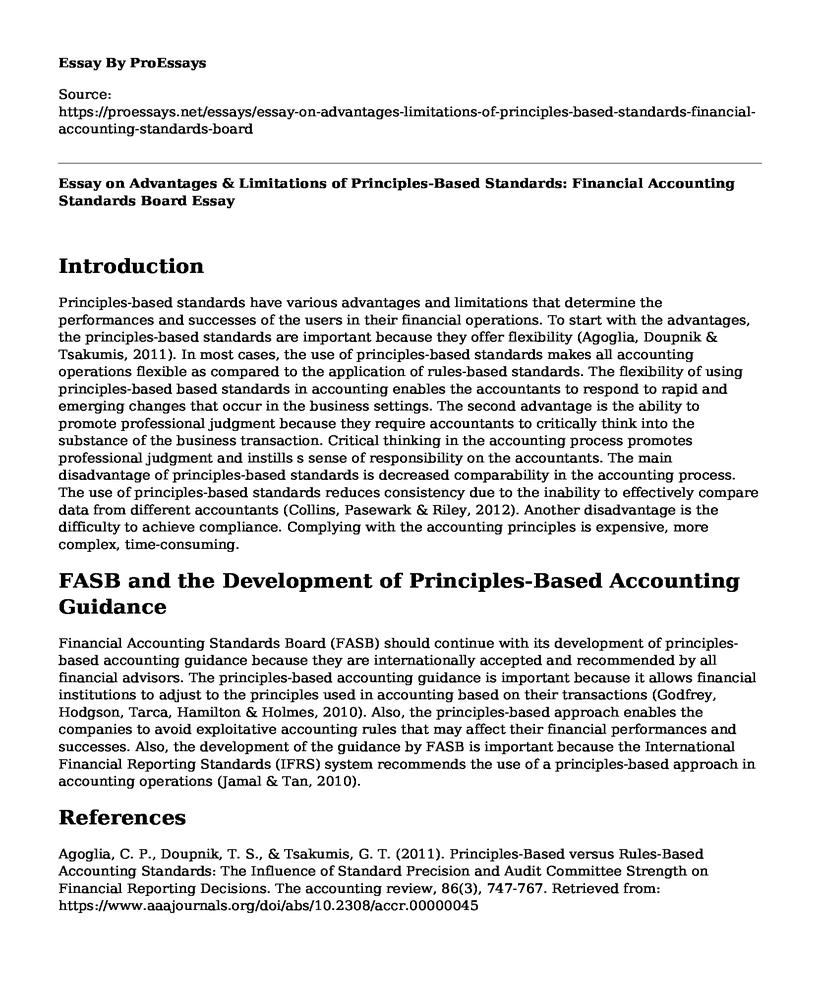Introduction
Principles-based standards have various advantages and limitations that determine the performances and successes of the users in their financial operations. To start with the advantages, the principles-based standards are important because they offer flexibility (Agoglia, Doupnik & Tsakumis, 2011). In most cases, the use of principles-based standards makes all accounting operations flexible as compared to the application of rules-based standards. The flexibility of using principles-based based standards in accounting enables the accountants to respond to rapid and emerging changes that occur in the business settings. The second advantage is the ability to promote professional judgment because they require accountants to critically think into the substance of the business transaction. Critical thinking in the accounting process promotes professional judgment and instills s sense of responsibility on the accountants. The main disadvantage of principles-based standards is decreased comparability in the accounting process. The use of principles-based standards reduces consistency due to the inability to effectively compare data from different accountants (Collins, Pasewark & Riley, 2012). Another disadvantage is the difficulty to achieve compliance. Complying with the accounting principles is expensive, more complex, time-consuming.
FASB and the Development of Principles-Based Accounting Guidance
Financial Accounting Standards Board (FASB) should continue with its development of principles-based accounting guidance because they are internationally accepted and recommended by all financial advisors. The principles-based accounting guidance is important because it allows financial institutions to adjust to the principles used in accounting based on their transactions (Godfrey, Hodgson, Tarca, Hamilton & Holmes, 2010). Also, the principles-based approach enables the companies to avoid exploitative accounting rules that may affect their financial performances and successes. Also, the development of the guidance by FASB is important because the International Financial Reporting Standards (IFRS) system recommends the use of a principles-based approach in accounting operations (Jamal & Tan, 2010).
References
Agoglia, C. P., Doupnik, T. S., & Tsakumis, G. T. (2011). Principles-Based versus Rules-Based Accounting Standards: The Influence of Standard Precision and Audit Committee Strength on Financial Reporting Decisions. The accounting review, 86(3), 747-767. Retrieved from: https://www.aaajournals.org/doi/abs/10.2308/accr.00000045
Collins, D. L., Pasewark, W. R., & Riley, M. E. (2012). Financial Reporting Outcomes under Rules-Based and Principles-Based Accounting Standards. Accounting Horizons, 26(4), 681-705. Retrieved from: https://www.aaajournals.org/doi/abs/10.2308/acch-50266
Godfrey, J., Hodgson, A., Tarca, A., Hamilton, J., & Holmes, S. (2010). Accounting Theory. https://researchdirect.westernsydney.edu.au/islandora/object/uws:20542/
Jamal, K., & Tan, H. T. (2010). Joint Effects of Principles-Based versus Rules-Based Standards and Auditor Type in Constraining Financial Managers' Aggressive Reporting. The Accounting Review, 85(4), 1325-1346. https://www.aaajournals.org/doi/abs/10.2308/accr.2010.85.4.1325
Cite this page
Essay on Advantages & Limitations of Principles-Based Standards: Financial Accounting Standards Board. (2023, Feb 09). Retrieved from https://proessays.net/essays/essay-on-advantages-limitations-of-principles-based-standards-financial-accounting-standards-board
If you are the original author of this essay and no longer wish to have it published on the ProEssays website, please click below to request its removal:
- Revenue Recognition
- Citations of Advantages and Disadvantages of Accounting Information Systems
- Research Paper on Financial Accounting Theory
- Paper Example on Organizational Financial Sustainability: Book vs Journal
- Essay on Growth Strategy: Conagra Brands' Acquisition of Cranswick Plc's Subsidiary
- Essay on Gross Income: Inclusions/Exclusions, Accounting Methods & Impact
- History of Alcohol: Ancient Times to Today







